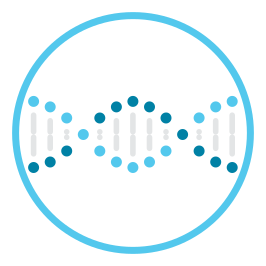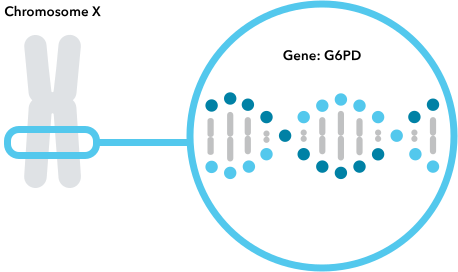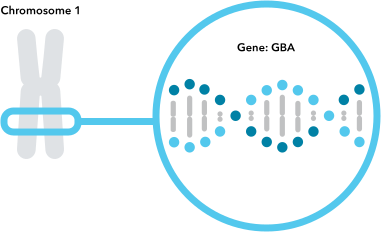23andMeLet's Talk about Genetics
Welcome to the 23andMe Genetics Learning Hub. Discover how genetics - as well as environmental, lifestyle, and other factors - can impact your likelihood of developing certain health conditions or having certain traits.
Showing 6 of 125

Are Homocysteine Levels Genetic?
Learn more about the causes of elevated homocysteine levels, and how the MTHFR gene can impact your...
Read more - about Are Homocysteine Levels Genetic?
Is Osteoporosis Genetic?
Learn more about the causes of osteoporosis, and how genetics can impact your likelihood of...
Read more - about Is Osteoporosis Genetic?
Emotional Eating
Learn more about how genetics can impact your likelihood of frequent emotional eating.
Read more - about Emotional Eating
Is Parkinson’s Disease Genetic?
Learn more about what causes Parkinson's Disease and what your DNA can tell you about your...
Read more - about Is Parkinson’s Disease Genetic?
Is G6PD Deficiency Genetic?
Learn more about what causes G6PD Deficiency and what your DNA can tell you about your likelihood...
Read more - about Is G6PD Deficiency Genetic?
Gaucher Disease Type 1 & Genetics
Learn more about the genetics of Gaucher disease type 1. For important test information about...
Read more - about Gaucher Disease Type 1 & Genetics
Discover what you can learn from your DNA
Learn about topics like ancestry, wellness, traits, health predispositions (including genetic health risks), carrier status, and pharmacogenetics. You can discover how your DNA can provide insights into these topics as well.
23andMe’s reports provide genetic insights that can help you discover more about yourself and what makes you unique. With our Health Predisposition Reports*, find out how your genetics may influence the chances of developing certain health conditions. Our Wellness reports can help you understand how genetic factors may influence certain traits and conditions that can affect your quality of life. See how likely your unique appearance and senses are based on your DNA with our Traits Reports. Our Carrier Status Reports* can help you learn if you’re a carrier for certain inherited conditions, before you start a family. And learn more about how your DNA may impact how your body processes certain medications with our Pharmacogenetics Reports**.
23andMe ancestry reports and features give you the most comprehensive ancestry breakdown on the market, with up to 80+ personalized reports, coverage of more than 2000 geographic regions, and ancestry percentages to the 0.1%. We’ll also assemble a timeline of your genetic ancestry spanning over eight generations.
*23andMe health predisposition reports include both reports that meet FDA requirements for genetic health risks and reports which are based on 23andMe research and have not been reviewed by the FDA. The test uses qualitative genotyping to detect select clinically relevant variants in the genomic DNA of adults from saliva for the purpose of reporting and interpreting genetic health risks. It is not intended to diagnose any disease. Your ethnicity may affect the relevance of each report and how your genetic health risk results are interpreted. Each genetic health risk report describes if a person has variants associated with a higher risk of developing a disease, but does not describe a person’s overall risk of developing the disease. The test is not intended to tell you anything about your current state of health, or to be used to make medical decisions, including whether or not you should take a medication, how much of a medication you should take, or determine any treatment. Our carrier status reports can be used to determine carrier status, but cannot determine if you have two copies of any genetic variant. These carrier reports are not intended to tell you anything about your risk for developing a disease in the future, the health of your fetus, or your newborn child’s risk of developing a particular disease later in life. For certain conditions, we provide a single report that includes information on both carrier status and genetic health risk. Warnings & Limitations: The 23andMe PGS Genetic Health Risk Report for BRCA1/BRCA2 (Selected Variants) is indicated for reporting of 44 variants in the BRCA1 and BRCA2 genes. The report describes if a person’s genetic result is associated with an increased risk of developing breast cancer and ovarian cancer and may be associated with an increased risk for prostate cancer, pancreatic cancer, and potentially other cancers. The variants included in this report do not represent the majority of the BRCA1/BRCA2 variants in people of most ethnicities. This report does not include variants in other genes linked to hereditary cancers and the absence of variants included in this report does not rule out the presence of other genetic variants that may impact cancer risk. This report is for over-the-counter use by adults over the age of 18, and provides genetic information to inform discussions with a healthcare professional. The PGS test is not a substitute for visits to a healthcare professional for recommended screenings or appropriate follow-up. Results should be confirmed in a clinical setting before taking any medical action. For important information and limitations regarding each genetic health risk and carrier status report, visit 23andme.com/test-info/
**23andMe PGS Pharmacogenetics reports: The 23andMe test uses qualitative genotyping to detect 3 variants in the CYP2C19 gene, 2 variants in the DPYD gene and 1 variant in the SLCO1B1 gene in the genomic DNA of adults from saliva for the purpose of reporting and interpreting information about the processing of certain therapeutics to inform discussions with a healthcare professional. It does not describe if a person will or will not respond to a particular therapeutic and does not describe the association between detected variants and any specific therapeutic. Our CYP2C19 Pharmacogenetics report provides certain information about variants associated with metabolism of some therapeutics and provides interpretive drug information regarding the potential effect of citalopram and clopidogrel therapy. Results for SLCO1B1 and DPYD and certain CYP2C19 results should be confirmed by an independent genetic test prescribed by your own healthcare provider before taking any medical action. Warning: Test information should not be used to start, stop, or change any course of treatment and does not test for all possible variants that may affect metabolism or protein function. The PGS test is not a substitute for visits to a healthcare professional. Making changes to your current regimen can lead to harmful side effects or reduced intended benefits of your medication, therefore consult with your healthcare professional before taking any medical action. For important information and limitations regarding Pharmacogenetic reports, visit www.23andme.com/test-info/pharmacogenetics.